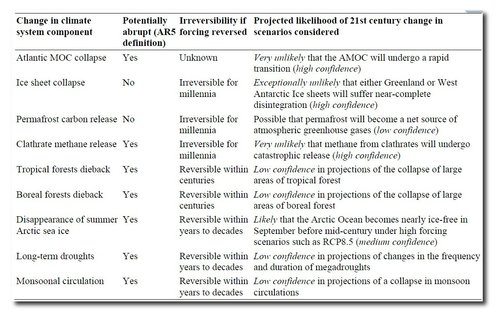The Royal Society is holding a two-day meeting to discuss the Working Group I report of the IPCC. Reader Katabasis was there and send this report.
So the first day of the meeting at the Royal Society to discuss the IPCC AR5 report was quite an eye-opener .
.
The tone was set from the start with the first two speakers wringing their hands over the issue of "communicating the message", pointing out that sceptics were apparently "very good" at it. According to Mark Walport, chief scientific adviser to the Government, we sceptics (sorry, those who "deny the science") are "single issue, great communicators." Thomas Stocker followed in the second talk emphasising the "Key 19 messages" in the SPM report.
Bob Ward of the Grantham Institute, in the audience, stood and made some handwaving point that included "knowing that there were sceptics here who managed to get a ticket". He cast his arm around to take in the whole audience as he said this and I wondered if he thought we were like hidden bodysnatchers amongst the innocent attendees that everyone needed to be wary of.
I made lots of notes during the day; however, in the interests of brevity I'll just mention a few highlights and then go into more detail regarding the final talk that really demonstrated the shocking discrepancy between the IPCC's actual position and the media's hysterical portrayal of it.
The day was, as expected, extremely model heavy. When actual observations were superimposed upon model projections they were often embarrassingly small relative to the "data" supposedly being presented. Model outputs were continually referred to as "data", including outputs that refer to something in the future.
Several speakers referred to claims that global warming has stopped. They said this claim was untrue and that in fact warming was continuing, it had just slowed down. This is despite the fact that in section B.1 of the SPM, it says: "the rate of warming over the past 15 years (1998–2012; 0.05 [–0.05 to +0.15] °C per decade)"
There was a palpable air of many having been rattled by "the hiatus". Excuses ranged from aerosols to soot to natural variability. One of the latter invocations caused an intervention from the Met Office's Julia Slingo - she pointed out that the PDO could lead to no further warming for up to 30 years, "so we're not out of the woods yet". I thought that was a particularly curious turn of phrase given how so many dedicated alarmists tell me they would be overjoyed if no global warming came to pass.
Throughout the day though, having read through the SPM a third time, and taken in more layers of official IPCC positions I became increasingly conscious of the greatly diminshed role of feedbacks. I checked through the SPM one more time, looking at each reference to "feedback". No I wasn't imagining it, it is very muted. Suddenly the focus of almost every presentation on predictions for the year 2100 made more sense. We'd previously been promised fire and brimstone long before that. The IPCC it seems, was actually climbing down from this position, though I didn't quite grasp how profoundly until the final talk by Matt Collins on 'What is the chance of abrupt or irreversible changes?':
What "Abrupt" and "Irreversible" mean in IPCC speak
AR5 has apparently introduced very specific definitions for the above.
Inigo Montoya, in the film, 'The Princess Bride', says to one of the main antagonists, “You Keep Using That Word, I Do Not Think It Means What You Think It Means”, after he says "Inconcievable!" for the nth time that his plans are foiled. 'Abrupt' and 'Irreversible' will obviously be reported by the media in quite lurid terms. They won't match the reality of what the IPCC means by them unless the journalist as done their homework. Both definitions can be found in the section 'TFE.5: Irreversibility and Abrupt Change' in the draft report and are worth repeating in full here:
"Abrupt climate change is defined in AR5 as a large-scale change in the climate system that takes place over a few decades or less, persists (or is anticipated to persist) for at least a few decades, and causes substantial disruptions in human and natural systems."
Is that quite what you thought it would mean? No, me neither. Wait, there's more:
A change is said to be irreversible if the recovery timescale from this state due to natural processes is significantly longer than the time it takes for the system to reach this perturbed state.
Abrupt changes that aren't really abrupt and irreversible changes that aren't really - er - irreversible.
Catastrophe? Er - we don't know.
Matt Collins began his talk disarmingly by saying that it could well have been very short - he could have just got up on stage and said "we don't know". I'm glad he didn't because otherwise I would not have been made aware of Table 12.4 in the draft report. It lists all of the catastrophic scenarios that many of us have become used to hearing wailed over by the media and associated directly with the notion of "strong positive feedbacks". Collins showed us the table and went through the details of two of the entries as examples of just how uncertain this area was (click image for full size).
 What? Yes that's right. The real story may not be in the IPCC rowback on temperature ranges, or its cack-handed "explanations" for the stalling temperatures. It may in fact all be in this table. Be sure to look for yourself. Every single catastrophic scenario bar one has a rating of "Very unlikely" or "Exceptionally unlikely" and/or has "low confidence". The only disaster scenario that the IPCC consider at all likely in the possible lifetimes of many of us alive now is "Disappearance of Arctic summer sea ice", which itself has a 'likely' rating and liable to occur by mid century with medium confidence. As the litany of climate disasters go, that's it.
What? Yes that's right. The real story may not be in the IPCC rowback on temperature ranges, or its cack-handed "explanations" for the stalling temperatures. It may in fact all be in this table. Be sure to look for yourself. Every single catastrophic scenario bar one has a rating of "Very unlikely" or "Exceptionally unlikely" and/or has "low confidence". The only disaster scenario that the IPCC consider at all likely in the possible lifetimes of many of us alive now is "Disappearance of Arctic summer sea ice", which itself has a 'likely' rating and liable to occur by mid century with medium confidence. As the litany of climate disasters go, that's it.
This prompted me to put a question to him, which was the first I'd been able to raise via the chair all day (I'd tried in several talks). I said to Matt:
"What the IPCC says, and what the media says it says are poles apart. Your talk is a perfect example of this. Low liklihood and low confidence for almost every nightmare scenario. Yet this isn't reflected at all in the media. Many people here have expressed concern at the influence of climate sceptics. Wouldn't climate scientists' time be better spent reining in those in the media producing irresponsible, hysterical, screaming headlines?"
Tumbleweed followed for several seconds. Then Matt said:
"Not my responsibility".